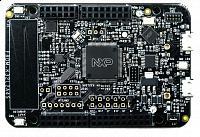FRDM-K32L2A4S

-
Core
Cortex-M0+
-
Device
K32L2A41VLL1A -
CMSIS Pack
FRDM-K32L2A4S_BSP
-
freertos_mutex
µVision AC6This document explains the freertos_mutex example. It shows how mutex manage access to commonresource (terminal output).The example application creates two identical instances of write_task. Each task will lock the mutexbefore printing and unlock it after printing to ensure that the outputs from tasks are not mixedtogether.The test_task accept output message during creation as function parameter. Output message have twoparts. If xMutex is unlocked, the write_task_1 acquire xMutex and print first part of message. Thenrescheduling is performed. In this moment scheduler check if some other task could run, but secondtask write_task+_2 is blocked because xMutex is already locked by first write task. The firstwrite_task_1 continue from last point by printing of second message part. Finaly the xMutex isunlocked and second instance of write_task_2 is executed.
Download Pack -
freertos_mutex
µVision AC6This document explains the freertos_mutex example. It shows how mutex manage access to commonresource (terminal output).The example application creates two identical instances of write_task. Each task will lock the...See more details in readme document.
Download Pack -
freertos_mutex
Keil Studio AC6, GCC, IARThis document explains the freertos_mutex example. It shows how mutex manage access to commonresource (terminal output).The example application creates two identical instances of write_task. Each task will lock the...See more details in readme document.
Download Pack -
freertos_mutex
Keil Studio AC6, GCC, IARThis document explains the freertos_mutex example. It shows how mutex manage access to commonresource (terminal output).The example application creates two identical instances of write_task. Each task will lock the mutexbefore printing and unlock it after printing to ensure that the outputs from tasks are not mixedtogether.The test_task accept output message during creation as function parameter. Output message have twoparts. If xMutex is unlocked, the write_task_1 acquire xMutex and print first part of message. Thenrescheduling is performed. In this moment scheduler check if some other task could run, but secondtask write_task+_2 is blocked because xMutex is already locked by first write task. The firstwrite_task_1 continue from last point by printing of second message part. Finaly the xMutex isunlocked and second instance of write_task_2 is executed.
Download Pack -
freertos_queue
µVision AC6This document explains the freertos_queue example. This example introduce simple logging mechanismbased on message passing.Example could be devided in two parts. First part is logger. It contain three...See more details in readme document.
Download Pack -
freertos_queue
µVision AC6This document explains the freertos_queue example. This example introduce simple logging mechanismbased on message passing.Example could be devided in two parts. First part is logger. It contain three tasks:log_add().....Add new message into the log. Call xQueueSend function to pass new message into message queue.log_init()....Initialize logger (create logging task and message queue log_queue).log_task()....Task responsible for printing of log output.Second part is application of this simple logging mechanism. Each of two tasks write_task_1 andwrite_task_2 print 5 messages into log.
Download Pack -
freertos_queue
Keil Studio AC6, GCC, IARThis document explains the freertos_queue example. This example introduce simple logging mechanismbased on message passing.Example could be devided in two parts. First part is logger. It contain three tasks:log_add().....Add new message into the log. Call xQueueSend function to pass new message into message queue.log_init()....Initialize logger (create logging task and message queue log_queue).log_task()....Task responsible for printing of log output.Second part is application of this simple logging mechanism. Each of two tasks write_task_1 andwrite_task_2 print 5 messages into log.
Download Pack -
freertos_queue
Keil Studio AC6, GCC, IARThis document explains the freertos_queue example. This example introduce simple logging mechanismbased on message passing.Example could be devided in two parts. First part is logger. It contain three...See more details in readme document.
Download Pack -
freertos_sem
Keil Studio AC6, GCC, IARThis document explains the freertos_sem example, what to expect when running it and a briefintroduction to the API. The freertos_sem example code shows how semaphores works. Two differenttasks are synchronized in bilateral rendezvous model.The example uses four tasks. One producer_task and three consumer_tasks. The producer_task starts bycreating of two semaphores (xSemaphore_producer and xSemaphore_consumer). These semaphores controlaccess to virtual item. The synchronization is based on bilateral rendezvous pattern. Both ofconsumer and producer must be prepared to enable transaction.
Download Pack -
freertos_sem
µVision AC6This document explains the freertos_sem example, what to expect when running it and a briefintroduction to the API. The freertos_sem example code shows how semaphores works. Two differenttasks are synchronized in bilateral rendezvous model.The example uses four tasks. One producer_task and three consumer_tasks. The producer_task starts bycreating of two semaphores (xSemaphore_producer and xSemaphore_consumer). These semaphores controlaccess to virtual item. The synchronization is based on bilateral rendezvous pattern. Both ofconsumer and producer must be prepared to enable transaction.
Download Pack
